The UK finds itself at a critical juncture, navigating the complexities of its post-Brexit relationship with the EU and seeking to forge strong trade ties with the US amidst rising protectionist sentiments. As Prime Minister Rishi Sunak prepares for meetings with German Chancellor Olaf Scholz and EU officials, the looming threat of US trade tariffs casts a shadow over the UK’s economic future. The Conservative Party has issued a stark warning to Labour leader Keir Starmer, arguing that aligning too closely with the EU could jeopardize a potential trade deal with the US and expose Britain to damaging tariffs. This warning underscores the delicate balancing act the UK must perform as it seeks to define its global role in a shifting geopolitical landscape.
The debate revolves around the potential repercussions of Keir Starmer’s planned discussions with EU officials on defense cooperation and closer ties. Critics within the Conservative Party, including Shadow Business Secretary Andrew Griffith, contend that such moves signal a prioritization of the EU relationship over a potential US trade deal. They argue that closer alignment with the EU could provoke retaliatory tariffs from the US, a consequence they believe could be avoided by prioritizing a transatlantic trade agreement. This perspective highlights the tension between maintaining strong ties with Europe and pursuing independent trade relationships with other global powers.
Adding fuel to the fire, former US President Donald Trump’s protectionist rhetoric and his previous imposition of tariffs on various countries have heightened concerns about the UK’s vulnerability in a potential trade war. Trump’s criticism of the EU’s trade practices and his threats of further tariffs raise the stakes for the UK, which must carefully navigate its relationship with both blocs to minimize economic fallout. This concern is particularly acute given the potential for escalating tariffs to trigger a global trade war, with significant implications for international commerce and economic stability.
Nigel Farage, a prominent figure in the Brexit campaign, reinforces the Conservative Party’s warning, asserting that close alignment with the EU on trade would preclude a trade deal with the US. This viewpoint underscores the perceived incompatibility between maintaining close ties with the EU and forging a separate, advantageous trade relationship with the US. It reflects a belief that the UK must choose between these two options, a dilemma that highlights the complexities of navigating a post-Brexit world.
Nile Gardiner, director of the Margaret Thatcher Centre for Freedom at The Heritage Foundation, echoes these concerns, arguing that Brexit presents an opportunity for the UK to avoid EU-targeted tariffs. He criticizes the prospect of aligning with the EU, which he portrays as being in decline, and advocates for prioritizing a relationship with the US, a global superpower. This stance underscores the view that the UK’s post-Brexit future lies in forging strong ties with the US, rather than remaining closely aligned with the EU.
Keir Starmer’s planned visit to the US later in the month, where he intends to advocate for the UK’s exemption from potential trade tariffs, adds another layer of complexity to the situation. Starmer’s anticipated argument, emphasizing the special relationship between the UK and the US, will be a critical test of the strength and resilience of this historical alliance in the context of evolving trade policies and global power dynamics. The outcome of this visit could significantly impact the UK’s economic future and its relationship with both the US and the EU.


